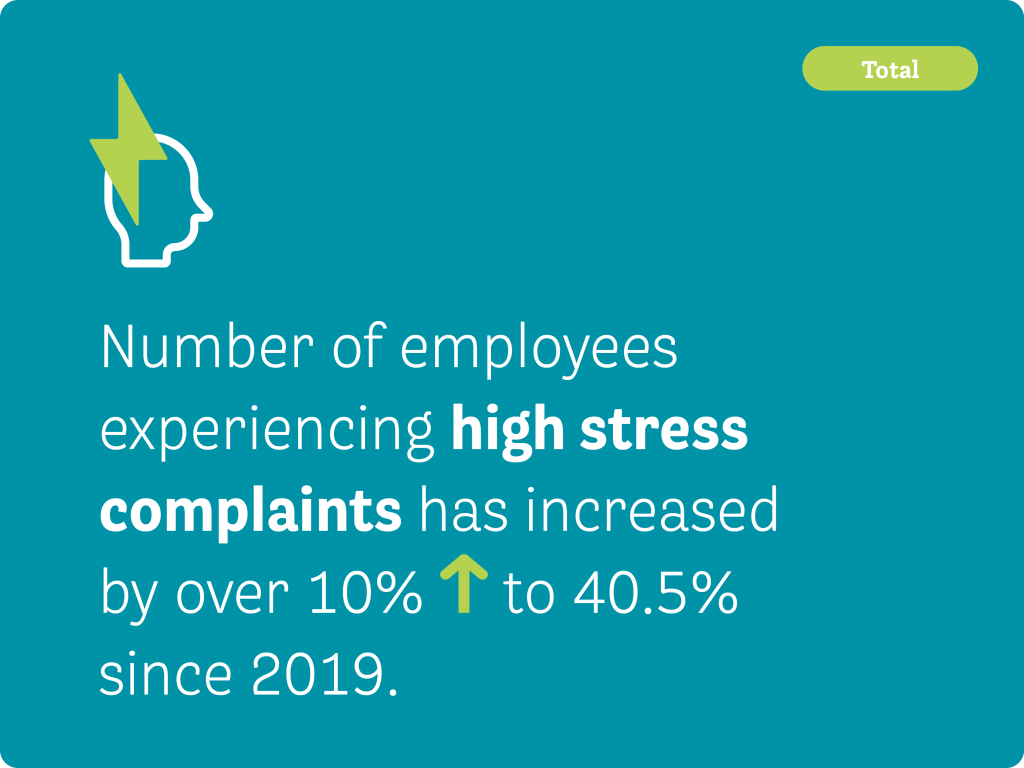Better stress management
The workplace is busy, which is usually good news. But a busy workplace can also cause employees to experience too much pressure. Being under too much pressure for too long is harmful to health and can lead to health complaints. Figures show that 20% of all absence days are caused by stress-related complaints.

Stress: Facts & Figures
A growing group of Dutch people experience stress at work. 1 in 5 employees are absent due to stress. Even 30% of long-term absence is stress-related. And how many stress complaints do employees experience who have not (yet) reported sick? Check out the facts & figures. Check out the facts & figures.

What customers have to say

SAP is an organisation that focuses its time and energy on countering stress and psychological complaints in the workplace. They deploy special Mental Well-being Ambassadors. You can read about their approach in an interview with Simone Langewouters - Health, Safety & Well-being officer at SAP.
Technology company ABB focuses all its activities regarding long-term employability on one umbrella concept: Fit4Future. One of its focal points is to make stress in the workplace a topic of discussion. Read the inspiring story of Antonie Klop, Country HR Manager of ABB.

Our professionals are ready to help

Company doctor & medical director Jurriaan Penders
“Stress is an individual’s reaction to their environment. How does an employee manage stress? What are problem-solving strategies and how well does a person take care of themselves? It’s all about balancing stressors and energy resources”.
There is a clear build-up in the nature and severity of stress complaints. But how do you recognise the signs in the workplace? How do you remove the causes? What opportunities are available for organisations? Jurriaan provides a detailed explanation in this article.
Read the article

Employment & organisation consultant Sanne van Rooij
“Work-related stress not only requires deploying interventions at the individual level. Organisational factors such as vision, culture and leadership are even more important. Organisational stress management policies are necessary in order to provide a structural solution to unhealthy stress.”
Identifying and discussing stress in your organisation is essential to prevent or reduce psychological absenteeism. Are you wondering how to tackle this? This article gives organisations tools for a sustainable solution.

Company welfare officer Bregje Ramakers
"Which buttons can you push to improve the situation? This can be in your private or working life, always looking at finding energy resources. This is how I support people to regain control and get energy from their work.”
Also watch the “Recovery, even while at work” webinar with concrete advice on how to support employees to stay energetic and healthy while at work.
Look together at how you can manage stress better, set goals and embed these goals.
As an employer you can have a positive impact on psychological absenteeism by making structural investments at organisational level in increasing mental strength. For this has a preventive and positive effect on all employees in your organisation. A clear vision and open culture where you discuss issues with each other are crucial here.
Do you know your employees’ energy resources, such as autonomy, support and development opportunities? It is important to discuss this because strengthening your employees’ energy resources is often more effective and easier than preventing stress or reducing workload. It also contributes to greater job satisfaction and, in turn, to better work performance.
Personal resources have to do with a person’s resilience and ability to successfully shape their environment to their own liking. Joint investments made by the employer and employees in personal resources increase the resilience of individual employees. Because resilience is a skill you can develop. The more resilience a person has, the less stress they experience during their job.
Many problems and stress can be avoided by discussing the topic and saying that employees can always come to you. This makes it easier for employees to raise the alarm in time if something is the matter. Read on for 11 tips for a good conversation.
By identifying signs of stress as early as possible, managers can play an important role in preventing full-time or part-time stress-related absenteeism of employees. More information about signs that may indicate stress can be found here.



Inspiration table:
Beter stress management
HumanCapitalCare organises Inspiration Tables throughout the Netherlands exclusively for its customers. During these tables, we engage with HR managers in a small setting on a topical issue.
Eight Inspiration Tables were recently held on the theme “Better stress management”. Topics included making stress a subject of discussion, strengthening energy resources and integrating a stress reduction approach into the organisational strategy. It was a pleasure to welcome customers from different sectors, including Ikea, Stork, TU/e, ANWB, Movella, Obvion, ABB, Maersk and Danone. Together, we strive for a future in which we keep employees healthy, motivated and competent.
In the media
Jinek - Jurriaan Penders, company doctor and medical director of HumanCapitalCare was at Jinek’s talk show to talk about the impact of psychological absenteeism. And, moreover, about how important it is to recognise signs early and make psychological complaints a subject of discussion. For psychological absenteeism remains a significant contributor to absenteeism. The longer you wait to address complaints, the longer your recovery will take; up to 279 days on average in case of a burnout. Log in and watch the broadcast.
Through the media, we regularly share our expertise and data with the Dutch working population. Every month, HumanCapitalCare publishes a current update on absenteeism in the Netherlands.

